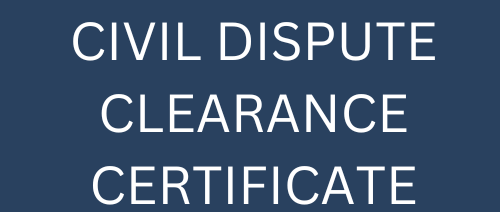"Daftese Consulting Private Limited"
CIVIL DISPUTE CLEARANCE CERTIFICATE
DETAILS ABOUT CIVIL DISPUTE CLEARANCE CERTIFICATE
3/12/20253 min read


CIVIL DISPUTE CLEARANCE CERTIFICATE
A Civil Dispute Clearance Certificate is not a widely recognized or standard document in India or most legal systems. However, in some cases, individuals or businesses may require a document or certificate confirming that there are no pending civil disputes or legal cases against them. This is typically requested in situations involving:
✅ Property transactions
✅ Business mergers or acquisitions
✅ Financial loans or credit approval
✅ Government contracts or tenders
✅ Visa or immigration processes
1. What is a Civil Dispute Clearance Certificate?
A Civil Dispute Clearance Certificate is a document that certifies that a person or entity:
Has no pending civil cases in a court of law.
Is not involved in any ongoing civil disputes related to property, contracts, or financial matters.
Has no legal judgments or orders against them in civil matters.
It serves as proof that the person or entity is legally clear and not involved in any civil litigation.
2. Purpose of a Civil Dispute Clearance Certificate
The certificate may be required for the following purposes:
✅ Property Transactions – To confirm that the property being sold or transferred is not under any legal dispute.
✅ Business Transactions – For business mergers, partnerships, or acquisitions.
✅ Loan Approvals – Banks and financial institutions may require it to approve loans.
✅ Government Contracts – To establish that the party has a clean legal record before awarding contracts.
✅ Visa and Immigration – To verify that the applicant is not involved in any legal issues.
✅ Employment Background Checks – Employers may request it for positions of responsibility.
3. Where to Obtain a Civil Dispute Clearance Certificate
A Civil Dispute Clearance Certificate is typically obtained from the following sources:
✅ District Court or High Court – For cases related to civil disputes (property, contract, or financial matters).
✅ Sub-Registrar Office – For property-related disputes.
✅ Revenue Department – For land and property disputes.
✅ Police Department – If the dispute has any criminal connection or police complaint.
✅ Lawyer or Legal Professional – To confirm that no civil cases are pending or filed.
4. Documents Required for Civil Dispute Clearance Certificate
To apply for a Civil Dispute Clearance Certificate, the following documents are generally required:
Document
Purpose
Application Form
Formal request for certificate issuance
Identity Proof
Aadhaar Card, Passport, Voter ID, or PAN Card
Address Proof
Utility bill, rental agreement, or bank statement
Property Documents (if applicable)
Sale deed, property tax receipt, or title deed
No Objection Certificate (NOC)
From relevant authorities (if applicable)
Affidavit (if required)
Stating that no civil cases are pending
5. Procedure to Obtain a Civil Dispute Clearance Certificate
The process for obtaining a Civil Dispute Clearance Certificate may involve the following steps:
✅ Step 1: Draft an Application
Write an application addressed to the appropriate authority (court or registrar).
Mention the purpose for which the certificate is required.
Include personal details and relevant property or business details.
✅ Step 2: Submit Supporting Documents
Attach proof of identity, address, and any related legal or property documents.
If the property is involved, include the sale deed or ownership documents.
✅ Step 3: Verification of Records
The authority (court, sub-registrar, or revenue department) will check legal records to confirm:
No civil cases are pending.
No legal judgments or disputes are recorded.
No encumbrances or legal claims are registered.
✅ Step 4: Issuance of Certificate
If no disputes or claims are found, the authority will issue a Civil Dispute Clearance Certificate.
The certificate will contain:
Applicant’s details
Status of civil cases (if any)
Certification of no pending disputes
Official stamp and signature of the authority
6. Timeline for Issuance
The time required to issue a Civil Dispute Clearance Certificate may vary depending on the authority:
Court Clearance – 7 to 30 days
Sub-Registrar Office – 10 to 15 days
Revenue Department – 7 to 14 days
Police Department – 7 to 10 days (if required)
7. Validity of the Certificate
The validity of a Civil Dispute Clearance Certificate is usually 6 months from the date of issue.
Some authorities may require renewal or re-verification after this period.
8. Legal Basis
A Civil Dispute Clearance Certificate is governed under the following laws in India:
📜 Civil Procedure Code, 1908 – Governs civil cases and disputes.
📜 Transfer of Property Act, 1882 – For property-related disputes.
📜 Registration Act, 1908 – For property registration and clearance.
📜 Specific Relief Act, 1963 – For the enforcement of contracts and property rights.
9. Challenges in Obtaining a Civil Dispute Clearance Certificate
🚫 Pending Disputes – If a civil case is pending, the certificate may not be issued.
🚫 Incomplete Records – Missing or unclear property or legal records may delay the process.
🚫 Third-Party Claims – Disputes arising from third-party claims on the property or contract.
🚫 Forgery or Fraud – Fraudulent documents or misrepresentation can lead to legal action.
10. Remedies if Certificate is Denied
✅ Legal Resolution – Settle any pending disputes through a legal process.
✅ Court Order – Obtain a court order confirming the resolution of disputes.
✅ Title Correction – Update property title or legal documents if discrepancies are found.
✅ Appeal Process – File an appeal with the higher authority if the certificate is denied without valid reason.
🚀 Conclusion
A Civil Dispute Clearance Certificate confirms that an individual or entity is free from civil disputes, enhancing legal credibility and ensuring smooth property or business transactions. While not a commonly issued document, it plays a critical role in property sales, business contracts, and loan approvals. Proper documentation, legal verification, and a clean record are essential for obtaining the certificate without delays.
